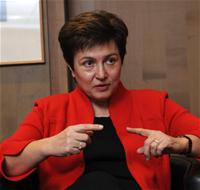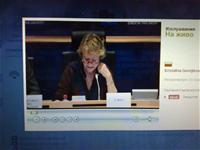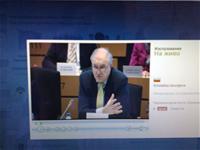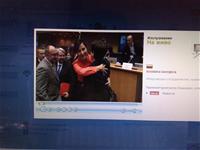Haiti - first priority of Christalina Gheorghieva
euinside, February 4, 2010
 The hearing of the second candidate of Bulgaria for European Commissioner in the second Commission of Jose Manuel Barroso Christalina Gheorghieva will be this afternoon. She is a Commissioner designate with the new portfolio International cooperation, Humanitarian aid and Crisis reaction. As a major priority the recent vice president of the World Bank has outlined the humanitarian crisis in Haiti. "In Haiti the Commission is already in process of organising of a long-term plan. The consequences of the earthquake in Haiti show that we have to improve the European and International humanitarian aid management and the overall capacity for system's response. Haiti is also an example of the necessity to clear define the roles of the military and humanitarian participants in situations of humanitarian crisis". Ms Gheorghieva writes to the European Parliament.
The hearing of the second candidate of Bulgaria for European Commissioner in the second Commission of Jose Manuel Barroso Christalina Gheorghieva will be this afternoon. She is a Commissioner designate with the new portfolio International cooperation, Humanitarian aid and Crisis reaction. As a major priority the recent vice president of the World Bank has outlined the humanitarian crisis in Haiti. "In Haiti the Commission is already in process of organising of a long-term plan. The consequences of the earthquake in Haiti show that we have to improve the European and International humanitarian aid management and the overall capacity for system's response. Haiti is also an example of the necessity to clear define the roles of the military and humanitarian participants in situations of humanitarian crisis". Ms Gheorghieva writes to the European Parliament.
Her second priority is related to an issue which her predecessor Rumyana Zheleva also raised - the problems with violations of international humanitarian law, restriction of humanitarian actions' space as well as the keeping of the delicate boundary between guaranteeing security of aid workers and the victims with their human rights being harmed on the one hand, and on the other keeping the neutrality of the aid. She does not offer a specific solution because, she said that the problem was very complex because "success in one area could mean more problems in another - reducing the risks for the security through military protection might undermine the neutrality principle itself which lies in the very foundation of humanitarian aid".
The third task Christalina Gheorghieva intends to work on if approved, is uniting all parts in her portfolio - humanitarian aid, civil protection and crisis reactions. She added that this could be realised in close cooperation among all respective EU agencies as well as with the respective UN agencies.
![]() 11:43 In the first hour of the hearing the Commissioner designate for
11:43 In the first hour of the hearing the Commissioner designate for  International cooperation and humanitarian aid Christalina Gheorghieva started intensely on issues related to her portfolio. Quite naturally, most of the questions focused on the situation in Haiti. Contrary on the criticism of some of the members of the European parliament that EU's aid was not well coordinated, it came too late and that even that the EU showed itself as a "black hole" after the disaster there, Ms Gheorghieva praised all European efforts by reminding that on the next day after the earthquake the European Commission had allocated 3 mn euro for the people, working on the ground in Haiti. Separately, the EU has planned 500 mn euro for emergency aid and for long-term recovery. 100 mn of this sum would be spent for non-humanitarian activities like rebuilding of the government institutions because the success in Haiti depended entirely on the Haiti government.
International cooperation and humanitarian aid Christalina Gheorghieva started intensely on issues related to her portfolio. Quite naturally, most of the questions focused on the situation in Haiti. Contrary on the criticism of some of the members of the European parliament that EU's aid was not well coordinated, it came too late and that even that the EU showed itself as a "black hole" after the disaster there, Ms Gheorghieva praised all European efforts by reminding that on the next day after the earthquake the European Commission had allocated 3 mn euro for the people, working on the ground in Haiti. Separately, the EU has planned 500 mn euro for emergency aid and for long-term recovery. 100 mn of this sum would be spent for non-humanitarian activities like rebuilding of the government institutions because the success in Haiti depended entirely on the Haiti government.
She was also asked why the EU did not have a visible presence in Haiti. People could see on TV around the world only Americans, French and Britons but the EU was not present as a Union there. To this the candidate responded that the different EU member states apply differently the European regulations in this area. And that according to the subsidiarity principle, she added, when something could be done on national level, it was not being done on a community level.
The green MEP Judith Sargentini who was most sharp during the hearing of the previous Bulgarian candidate Rumyana Zheleva a month ago, asked Christalina Gheorghieva how her job would precisely be formulated with regard to the international cooperation because it seems to be quite mixed with the responsibilities with other commissioners-designate. According to Ms Gheorghieva, she will work on international cooperation only in the context of humanitarian aid. She gave as an example the disaster situation in Myanmar almost 2 years ago when the local authorities did not allow deliveries of international aid. Then the international community initialed talks with the regional organisation ASEAN. This was exactly the way of work the commissioner-designate for the international cooperation should do, Gheorghieva further explained.
 Of course, the question of why Christalina Gheorghieva had decided to become a commissioner was not spared but the answer was endorsed with applause: "We've encountered quite unusual circumstances. People in Bulgaria were not very satisfied (with the situation with Rumyana Zheleva). My family lives in Bulgaria, my daughter lives there, so when I got the phone call I felt this was my duty. But this is also a matter of luck. There are 4 areas in the work of the Commission with which I have always been engaged with and I am very happy that I have the opportunity to work in the area of humanitarian aid".
Of course, the question of why Christalina Gheorghieva had decided to become a commissioner was not spared but the answer was endorsed with applause: "We've encountered quite unusual circumstances. People in Bulgaria were not very satisfied (with the situation with Rumyana Zheleva). My family lives in Bulgaria, my daughter lives there, so when I got the phone call I felt this was my duty. But this is also a matter of luck. There are 4 areas in the work of the Commission with which I have always been engaged with and I am very happy that I have the opportunity to work in the area of humanitarian aid".
There was a moment during the hearing, around the 2nd hour, when it could have been interrupted after a proposal of the MEP Michael Cashman, from the group of the Socialists and Democrats. He withheld his right to ask a question, saying that he was impressed by the overall performance of Ms Gheorghieva, of her erudition, competence, experience and confidence. Therefore he proposed the Development Committee to end the hearing and start the approval procedure. The chairwoman of the Committee, the green MEP Eva Joly announced that obviously there was consensus in the hall, given the applauses. Nevertheless, the hearing went on because of the many questions.
The good words of the British MEP were not the first. During the hearing a lot of MEP shared their admiration and delight before asking their questions. They were mostly impressed by her experience in the World Bank.
The most frequent questions towards her were about solving humanitarian crises in difficult  conflict zones like the Middle East, Darfur and Congo. With regard to the Middle East where Israel is blocking the aid deliveries for the Gaza Strip, Christalina Gheorghieva explained that 1 of the reasons behind this blockade was Israel's fears that humanitarian deliveries often contain double application goods. This is why she offered Israel to prepare a negative list with the goods which would not be allowed in the Gaza Strip and another - positive list - which would relieve the situation.
conflict zones like the Middle East, Darfur and Congo. With regard to the Middle East where Israel is blocking the aid deliveries for the Gaza Strip, Christalina Gheorghieva explained that 1 of the reasons behind this blockade was Israel's fears that humanitarian deliveries often contain double application goods. This is why she offered Israel to prepare a negative list with the goods which would not be allowed in the Gaza Strip and another - positive list - which would relieve the situation.
Asked whether she could use as leverage the Association agreement of Israel with the US, which is part of EU's Neighbourhood Policy and which is giving Israel certain preferential conditions in its relations with the Union, the candidate explained that the agreements with Israel should be used but added that she could not say what must be done. However, she promised that she would raise the issue with the Commissioners' College.
It would hardly be an exaggeration if we say that Christalina Gheorghieva's hearing in the  European Parliament was the best performance of a commissioner designate so far. The exam ended with a lot of applause which then transformed into handshaking, congratulating and hugs. The MEPs shared an unanimous impression that this was a very well prepared and worthy candidate.
European Parliament was the best performance of a commissioner designate so far. The exam ended with a lot of applause which then transformed into handshaking, congratulating and hugs. The MEPs shared an unanimous impression that this was a very well prepared and worthy candidate.
And although during the 3-hours hearing Ms Gheorghieva demonstrated cold blood and self-command, in her final statement she showed emotions for the first time saying that she could now promiser her mother something she had always dreamed of. As a person who witnessed the World War II and as a convinced European, Christalina's mother had always wanted her daughter to learn French. This is why she made her promise from the European tribune in French and the chairwoman of the Committee Eva Joly promised that the MEPs would help her in her lessons.
 The reactions of the political groups in the European Parliament were immediate. In a statement the group of the Greens and the European Free Alliance who were the most staunch critics of Rumyana Zheleva, note that Christalina Gheorghieva is the right person for the post. "Kristalina Georgieva left no doubt that she is the right woman for the job. In her hearing, she demonstrated that she has the human and professional qualities to be an excellent humanitarian aid Commissioner. She also showed a sensitivity to green issues, including the interconnection between development, environmental degradation and humanitarian aid. The only real question that remains is why Georgieva was not nominated by the Bulgarian government in the first place", Judith Sargentini says in a short statement.
The reactions of the political groups in the European Parliament were immediate. In a statement the group of the Greens and the European Free Alliance who were the most staunch critics of Rumyana Zheleva, note that Christalina Gheorghieva is the right person for the post. "Kristalina Georgieva left no doubt that she is the right woman for the job. In her hearing, she demonstrated that she has the human and professional qualities to be an excellent humanitarian aid Commissioner. She also showed a sensitivity to green issues, including the interconnection between development, environmental degradation and humanitarian aid. The only real question that remains is why Georgieva was not nominated by the Bulgarian government in the first place", Judith Sargentini says in a short statement.
The Socialists and Democrats also defined the Bulgarian candidate's performance as convincing. In a joint statement the co-presidents of the group Véronique de Keyser and Thijs Berman, said: "Ms Georgieva confirmed that she has the qualifications, the competence, the experience and the probity required to be a very good humanitarian aid commissioner. She masters the subject. She showed a capacity for detailed analysis and a great sense of communication. This is a relief".
Not even one of the Bulgarian MEPs who were present in the room did not ask a question to Christalina Gheorghieva during the hearing. The MEPs were Antonia Parvanova (who was blamed by the Bulgarian government as being in the centre of a conspiracy to discredit Rumyana  Zheleva), Iliyana Yotova, Stanimir Ilchev, Filiz Hyusmenova, Christian Vighenin and Metin Kazak. In a joint declaration the Bulgarian socialists note that Christalina Gheorghieva had demonstrated obvious competence on the issues she would work on as well as ideas and specific intentions which would increase EU's role in the field of crisis response and humanitarian aid.
Zheleva), Iliyana Yotova, Stanimir Ilchev, Filiz Hyusmenova, Christian Vighenin and Metin Kazak. In a joint declaration the Bulgarian socialists note that Christalina Gheorghieva had demonstrated obvious competence on the issues she would work on as well as ideas and specific intentions which would increase EU's role in the field of crisis response and humanitarian aid.
"We, the Bulgarian MEPs-socialists express our regret that the prime minister allowed our country to be humiliated by the first Bulgarian nomination. Now it is finally clear that the problem was in the very inadequate and aggressively and arrogantly imposed nomination of the prime minister and not in the "subversive" actions of the socialists. We hope that this is going to be an expensive lesson about the necessity of at least minimum European thinking and European criteria which Bulgarian government needs very much", the declaration of the Delegation of the Bulgarian socialists in the European Parliament ends.